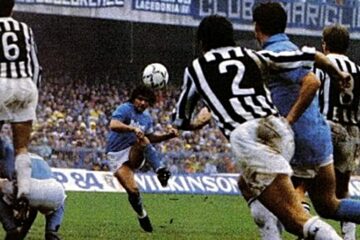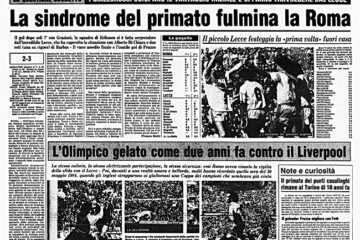The Decade Story of “Golden Goal” (1993-2004)!
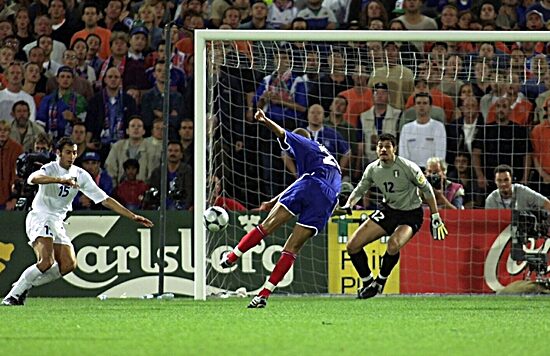
From the sublime to the ridiculous, the 1990s were undoubtedly a period of great transition for the game.
The golden goal was born out of a desire to halt the trend of cynical, risk-averse tactics, which were thought to diminish the appeal of football and encourage dramatic, attack-minded football.
Never was tactical conservatism more pronounced than in extra time, where the tense duels of the knockout stage, including the semi-finals, and the final required a penalty shootout. The indecisive nature of these matches proved important in convincing both FIFA and the IFAB (The International Football Association Board) that the traditional extra time format needed to be improved to encourage more successful outcomes in future competitions.
Originally christened with the very unmarketable name of ‘sudden death’, the “Golden Goal” rule was a bold departure from traditional extra time. Whereas previously teams were guaranteed 30 minutes of extra football to avoid a draw, the new rule now stated that the first team to score in extra time would immediately win the match.
Nothing has the capacity to provoke passionate debate in clubs and stadiums quite like the introduction of a new rule in football, and the “Golden Goal” was no exception. With a concept stolen directly from school playground regulations, the ethos of the new law, first-to-win in extra time, was steeped in romance and idealism.
While many applauded the positive intent shown by FIFA, other fans were skeptical about the rule’s ability to increase the emphasis on attacking, with some believing that the higher stakes would actually lead to more tactical caution.
After years of debate, the “Golden Goal” was tentatively introduced in 1993.
While at this point there was no obligation for major tournaments to implement the law, FIFA went down the familiar path of road-testing it at youth tournaments and ‘smaller’ competitions.
Although the first golden goal was scored at the 1993 World Youth Cup in Australia by hosts midfielder Anthony Carbone, it would be several years before the rule was used at the highest levels of the professional game.

Anthony Carbone The first player to score a “golden goal”
Over the next few years, the golden goal would be responsible for deciding some of football’s most glamorous awards. The first notable attempt at the rule on British shores would come at Wembley. The hero of the day was Birmingham midfielder Paul Tait, his 103rd-minute header flying into the Carlisle net, prompting commentator Alan Parry to declare with excitement: “For the first time in the history of Wembley, we can say with absolute certainty that this is the winner!”
It would be just over a year before Wembley would be known for the golden goal again, with the next occasion coming in the middle of the Euro 96 title decider. This time, fans would be treated to a moment befitting the old ground’s iconic status, as Germany beat the Czech Republic to win the tournament.
The protagonist was Oliver Bierhoff. The previously unheralded striker announced his arrival on the world stage as he came off the bench to save the day for “die Mannschaft” with a 1-0 victory. After the golden goal with a header in extra time, the future AC Milan hero would carve his name into German folklore as his speculative shot was mishandled by Petr Kouba, landing in the bottom left corner to end the match and the championship.
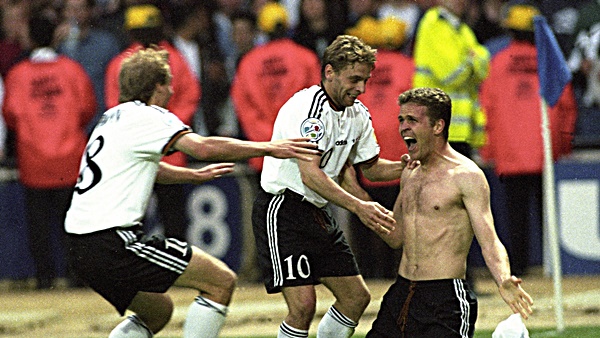
Over the next few years, the continuation of the golden goal would coincide with the rise of the French national team to dominance, and it would be Les Bleus, more than any other side, who would prosper from this short-lived law. France 98 would be the first time the format would be used at a World Cup, and it would be the hosts – through a Laurent Blanc strike against Paraguay in the last 16 – who would score the tournament’s first and only golden goal on their way to lifting the iconic gold trophy for the first time.
In the 2000 European Championship, France will face the Azzurri in a dramatic final on July 2. The Italians are ahead thanks to Del Vecchio’s goal in the 55th minute. With four minutes of extra time remaining, the regular 90 minutes are slowly winding down. The Italian fans at De Kuip are in high spirits as the Azzurri prepare to lift the European Championship for the first time since 1968. On the other side, a sea of fans in dark blue wear masks of despair as they begin to accept the inevitable.
But suddenly Wiltord scores (90+4`) 1-1 and the match goes to extra time, in an atmosphere where everyone has turned their heads waiting for the golden goal for the second consecutive Euro final. And so it happens, Trezeguet who will come off the bench scores in the 103rd minute, giving France their second European title since Platini’s time.

For every moment of glory, the golden goal was equally capable of serving as something of a farce. Never was this more evident than in 1994 when Barbados and Grenada gave us one of the most ridiculous, confusing and clear-cut moments in football history.
It was the Caribbean Cup qualifying stages, and the two nations faced each other in the final match of a three-team group consisting of the two aforementioned teams and Puerto Rico. In what would normally be a straight-up situation, Barbados entered the game ranked bottom of the group and they needed to beat Grenada by at least two goals to overtake the other teams and qualify for the tournament proper.
That’s where the fun begins.
In a departure from universally accepted norms, the Caribbean Cup organizers implemented a rule that stated that any group stage match that ended in a draw would result in a golden goal. To compound the oddity, it was decided that any golden goal scored would count as double. It was a decision that would blow up spectacularly in the faces of lawmakers.
With seven minutes of normal time remaining, Barbados were leading 2-1 and desperately needed another goal to avoid elimination. As time passed, the desperate Barbadians gave up on finding a third goal and decided that their best chance of qualification was to exploit the gap left by the odd rule. In the 87th minute, Barbados defender Terry Sealey and goalkeeper Horace Stoute began passing the ball back and forth before Sealey deliberately put the ball into his own net to send the game into extra time.
The final minutes of normal time would serve to further complicate the sheer absurdity of the regulation, as Barbados valiantly defended both goals, while Grenada tried in vain to score at either end. In a fitting conclusion, Barbados would have scored the golden goal and advanced at the expense of Grenada, but by this point the score was neither here nor there…..
Surprisingly, the rule was given an unfavorable view by Grenada manager James Clarkson, who echoed what everyone else was thinking when he said: “I feel cheated. The person who came up with these rules should be a candidate for a madhouse. The game should never be played with so many players running around the pitch confused. Our players didn’t even know which direction to attack: our goal or their goal. I’ve never seen that happen before. In football, you have to score against the opposition to win, not score own goals to win”
From France’s golden successes to the Barbados meltdown, there is no doubt that international football was responsible for most of the most iconic golden goal moments. Despite being in regular use throughout the decade, the appearance of a golden goal in club football proved to be relatively rare, with the law never deciding the outcome of a Champions League match. While the lack of influence within the club game gave opponents credible evidence against the law’s merits, there were nevertheless a few historic moments that left the rule with a legacy at club level.
The first of these would come in the 2000 UEFA Super Cup, as Galatasaray defeated Real Madrid (2-1) thanks to an extra-time strike by Mario Jardel (102′). Having been responsible for the outcome of one of the opening matches of the European calendar, the golden goal would have an even more profound effect at the end of the season, raising the prospect of a thrilling UEFA Cup final in Dortmund.
In a battle of the century, favorites Liverpool were pitted against Alaves, who had eliminated teams like Inter and Kaiserslautern en route to the 2000-2001 UEFA Cup final. With the score tied at 3-3, Liverpool must have thought they had done enough to add the cup to their trophy cabinet when, in the 72nd minute, their hero Robbie Fowler produced a brilliant finish to put Liverpool back 4-3 up. However, in a moment that befitted the madness of the game, former Manchester United player Jordi Cruyff scored against his old club’s bitter rivals with an 88th-minute header that ensured the 48,000 fans at the Westfalenstadion were treated to sudden death carnage.
Anyone who predicted that extra time would bring a more cautious approach was quickly made to eat their words, with a frantic 16 minutes that featured two red cards for Alavés and a goal disallowed for each side. Finally, in the 117th minute, Alavés were put to the sword in the most brutal way imaginable: full-back Delfí Geli headed a Gary McAllister free kick into his own net, scoring a ‘golden’ own goal and securing the famous silverware that would return to Anfield.
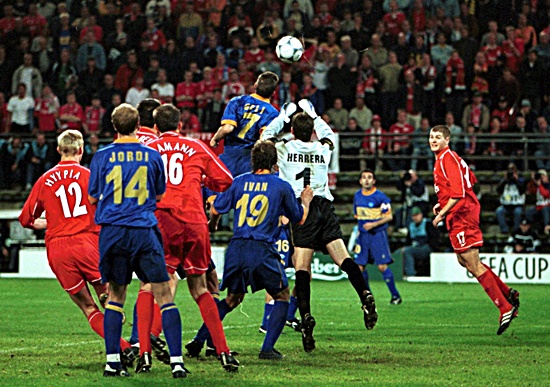
16 May 2001: Delfi Geli of Alaves scores an own goal to give Liverpool victory in the UEFA Cup Final
The 2002 World Cup would be the last time the golden goal would be used on football’s grandest stage and in a fitting departure, the rule would be responsible for deciding no fewer than three matches in the finals hosted by Korea and Japan. While Senegal would be both the beneficiary and the victim of the rule – Henri Camera’s 104th-minute strike saw them beat Sweden in the last 16 before the Africans fell to Turkey in the quarter-finals thanks to an Ilhan goal – the tournament’s most infamous golden goal. It came in South Korea’s match against Italy.
In a game rife with controversy and intrigue, the hosts benefited from a series of questionable refereeing decisions – from disallowed goals to soft penalties and questionable red cards – before shocking their heavily favored opponents with an 88th-minute equalizer from Seol Ki-Hyeon.
With three minutes of added time remaining, the Italians were stunned when Ahn Jung-Hwan – a striker who played for Perugia – rose above Paolo Maldini to take a 2-1 lead and score the winner, sending the crowd into raptures.
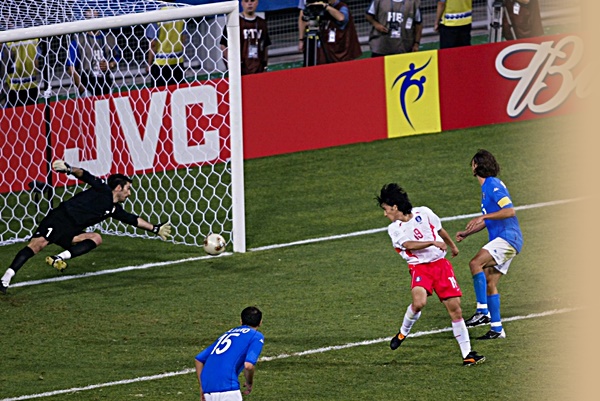
Unfortunately for Ahn, the controversy surrounding that match ensured that the goal would prove to be anything but golden for the Serie A striker from Perugia. While the perceived refereeing scandal sparked national outrage, Perugia president Luciano Gaucci did little to quell the hysteria.
In perhaps the most egregious example ever of a president throwing his toys out of the cart, an embittered Gaucci terminated Jung-Hwan’s contract, claiming: “That gentleman will never set foot in Perugia again. I have no intention of paying a salary to someone who has ruined calcio.”!!!
While criticism from South Korea coach Guus Hiddink, not to mention Perugia manager Sersi Cosmi himself, found Gaucci publicly remorseful for his initial stance, the damage had already been done and Ahn, at least in football terms, would never set foot in Perugia again. While the golden goal celebration in Korea and Japan provided one of the strongest cases for the rule’s merits, it was not enough to appease a large section of the football community who felt that it had, fundamentally, failed to live up to its promise of increased drama.
2.
Silver Goal
While many in the game predicted that the law was living on borrowed time, it was thought that the rule’s retirement would coincide with the return of the traditional extra-time format. Surprisingly, UEFA had other ideas. Introduced in the autumn of 2002 for European club competitions, the silver goal achieved the impossible feat of uniting both sides of the extra-time debate.
An attempted compromise between the golden goal and the extra-time rules, the silver goal stipulated that a goal scored in extra-time would not immediately win the match, but if it was scored in the first half of extra-time and the opponents equalized, then the match would end at half-time with the winner being whoever scored first.
It was hoped that the silver goal would inspire the same sense of urgency as the golden goal, while offering the conceding teams a fairer opportunity to get back into the game.
In practice, the rule brought out the worst in both sides: conservative tactics were as prominent as ever, but now they were joined by a whole new set of problems. Whereas the previous rules, however flawed, were simple concepts that were easy to follow, the silver goal caused complete bewilderment with the scoring of a guaranteed goal followed by a debate in the stands about what would happen next.
The most memorable example of the silver goal would come in the semi-finals of Euro 2004 in Portugal. The match in Porto would see a talented and in-form Czech Republic side struggling to break down their organized but uninspired Greek counterparts, with the deadlock still unbroken after 90 minutes.
With seconds remaining in the first half of extra time, Greek center back Traianos Dellas heads the ball past goalkeeper Petr Čech to send the Greeks into the final!
With the goal scored so late in the first half, play was immediately halted, giving the Czechs no time at all to equalize. Although the rules may have called it a silver goal, Della’s winner at the Estádio do Dragão was golden in everything but name.
This goal would mark the end of an era.
In the run-up to Euro 2004, the IFAB announced that, after the tournament, the golden goal and silver goal rules would be removed from the Laws of the Game in favour of a return to the traditional extra-time format.
After a decade in the spotlight, the rule that had been woven into the narrative of some of the era’s most iconic moments was now consigned to the history books. A true symbol of its time, the golden goal leaves behind a complex legacy. After nearly a decade at the heart of the game, the rule can neither be considered an unmitigated success nor a total failure.
While critics claim that its uncompromising nature further stifled attacking play, in many cases the law simply underlined the approach that teams would have taken anyway if extra-time had been contested in the standard format.
For every attacking-minded outfit emboldened by the opportunity to instantly kill their opponents, there were a host of cautious teams paralyzed by fear of making that fatal mistake late in the tournament. What seemed like a seismic shift in the extra-time format ultimately changed very little.
While it may not have delivered the revolutionary change its creators promised, the golden goal was an intriguing experiment that decided tournaments, created legends and left an indelible mark on a glorious era.
By Pjerin Bj
New York: November 21, 2024
___________________
Sports Vision +Plus / Hour of Champions in activity since 2013
Discover more from Sports Vision +
Subscribe to get the latest posts sent to your email.


